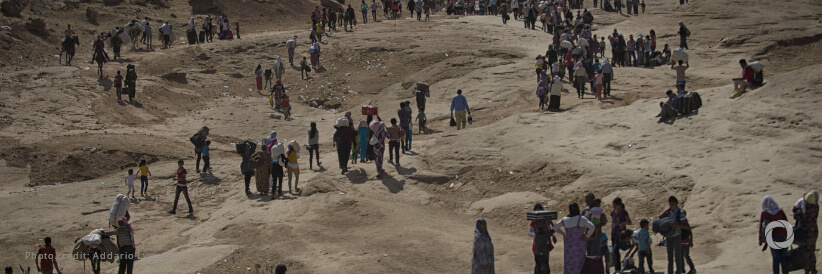Some 400,000 Syrians have returned from neighbouring countries since the fall of the Assad regime on 8 December 2024, according to estimates by UNHCR, the UN Refugee Agency.
During the same period, more than 1 million internally displaced people (IDPs) within Syria have also returned, bringing the total number of Syrians who have gone home to over 1.4 million.
As the school year ends, summer will be a critical moment for voluntary returns and a window of opportunity not to be missed. However, to make these returns successful and sustainable, Syrians will need support with shelter, livelihoods, protection, and legal assistance – areas in which UNHCR has proven expertise.
The risk is that, without adequate funding, the projected 1.5 million returns this year may not happen, and those who do return may have no choice but to leave again. Support for UNHCR and humanitarian actors is crucial for stability. The severe funding cuts that UNHCR is facing are putting millions of lives at risk, with nearly 16.7 million people inside Syria – about 90 per cent of the population – requiring some form of humanitarian assistance, and over 7.4 million Syrians still internally displaced.
Is time to invest in facilitating the return of refugees who have been waiting years for this moment. In January, UNHCR launched an operational framework to help 1.5 million refugees and 2 million IDPs return home in 2025. So far, only $71 million has been pledged of the $575 million required for UNHCR’s 2025 programmes inside Syria. Without additional funding, the organization will only be able to help a fraction of those who intend to go back, meaning fewer returning home.
There has been a significant reduction in donor funding between 2024 and 2025. These cuts are impacting the workforce, which will shrink by 30 per cent inside Syria, significantly affecting our ability to provide critical support.
Additionally, without proper funding, some of UNHCR’s life-saving activities will halt. Among the 122 community centres supported by UNHCR, 44 per cent will have to close by the summer. Community centres provide critical aid such as mental health support, legal assistance, prevention of gender-based violence and mine awareness education. They also foster social cohesion, and their closure will impact returnees and their communities as well as UNHCR’s local partners.
Despite these difficult and unprecedented times, UNHCR is committed to staying and delivering in Syria. United Nations High Commissioner for Refugees is working closely with UN agencies including WFP, IOM, UNDP and UNICEF; helping returnees must be a collaborative effort to ensure efficiency and impact.
UNHCR appreciate the support it has received for many years for the operation in Syria from the traditional donors. The organization is asking them to make an extra effort despite the global economic challenges, but is also appealing to wealthy countries who have not been contributing to support in ensuring the safe and dignified return of Syrian refugees willing to go home. It is crucial not to miss this historic opportunity.
To assist Syrians in their decision to return home, UNHCR launched “Syria is Home,” an innovative digital information platform to provide timely and impartial information on the return process including legal steps, identification documents, access to housing, health care, education and more. Frequently asked questions (FAQs) offer guidance on renewing identity documents, support to repair destroyed or damaged homes and accessing legal aid and counselling support.
Through ‘Syria is Home,’ UNHCR provides credible and up-to-date information vital for helping people make informed decisions, plan for their future and maintain hope. Information is continuously updated.
Since the fall of the Assad regime, returning home and starting anew has become a possibility for Syrians. With investment in aid and early recovery, UNHCR can create opportunities and keep up the hope of Syrians. Seizing this opportunity is the collective responsibility.

